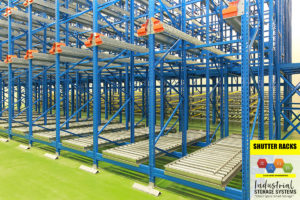Industrial racking is a method of arranging items on pallets or other auxiliary parts to form a unified load that is easier to store and carry along the supply chain. It was created during WWII to improve transportation and was originally only available in wood. Nowadays, in warehouses and logistics in general, it’s all about grouping the most commonly used commodities, with most of the racking built to store large loads being specifically designed for the storage of pallet loads. Pallet loads play an important part in practically all the company’s logistical phases, including warehouse handling and transportation. Pallet racking is used in most warehouses and distribution centers to coordinate storage and distribution.

Pelletizing items for storage on industrial racking provides various advantages, which can be stated as follows:
- Compacting items and better use of available space
- Greater safety in product movement
- Greater flexibility in product transport and handling
- Stock and inventory control made simple
- Reduced handling, transport, and storage costs
Pallet Flow Rack
Pallet flow rack grants faster throughput of stock and improves productivity.
Pallets on the pallet flow rack go automatically from the loading face to the order picking face, providing for faster stock throughput with little handling. Each pallet flow segment comprises roller lanes attached to rack beams at a slight slant to allow pallets to flow smoothly down to the picking face once they are loaded from the back of the system. This optimizes stock rotation and avoids waste of fresh and data-sensitive products with FIFO live pallet storage. Pallet flow storage can boost warehouse productivity, capacity, and efficiency while also providing a high return on investment.
Double Deep
One row of selective racking is placed behind another to form double-deep racks. This is the most cost-effective method of constructing high-density storage. As a result, storage capacity can be increased by 40%.
Recommended for: general warehousing, manufacturing.
Back Racking / Push-Back Rack
In a push-back rack, pallets are stored on carts (up to five deep) that slide forward when the pallet in front is removed. It’s comparable to how grocery store refrigerated beverages are organized. Pallets are fed and retrieved from a single lane, reducing picking times and making these racks ideal for applications with multiple picking faces. This is a common choice for food-related businesses.
Recommended for: general warehousing, retail, food
Drive-In/Drive-Thru Rack
Drive-In/Drive-Thru Rack requires fewer aisles than traditional (selected) pallet racks, allowing you to store up to 75 percent more pallets. Forklifts drive right into the racks, which can hold up to six pallets. A drive-in rack has a shared entrance/exit, whereas a drive-through rack has its own entry and exit. This pallet racking system
- comes with a welded frame design that is exceptionally stiff and sturdy
- allows the use of either roll-formed or structural steel components with different arm and rail combinations
- reduces space expenses, holds more weights
- designed for functionality, looks, and long life
- large-volume storage of identical products, general warehousing, freezer/cooler, and high-turnover retail products are all recommended.
Roll Formed Cantilever Rack
The Cantilever rack is great for storing longer, bulkier products like carpet rolls, furniture, lumber, tubing, tires, textiles, piping, and similar items because there are no aisle uprights to hinder the use of horizontal space. Joint pin locks that may be adjusted in height are sturdy, safe, and easy to use. Drip-in decks and spring-loaded entry guides are examples of accessories that improve safety and protection. These racks are made of structural steel or roll-formed steel.
With a pallet flow rack system, you can boost efficiency and throughput while also saving money! Allow Gold Wind to assist you with your industrial racking system’s design, implementation, and supply.
For all of your industrial racking system needs, visit Gold Wind Engineering!


 Malaysia
Malaysia